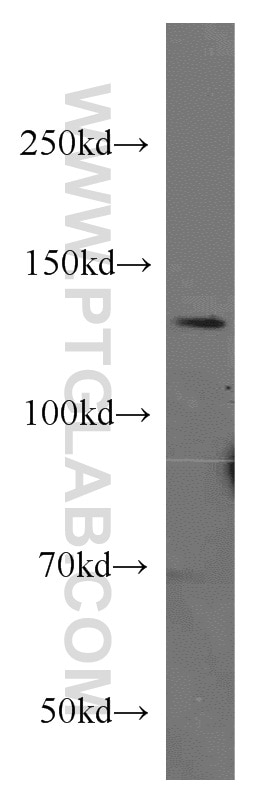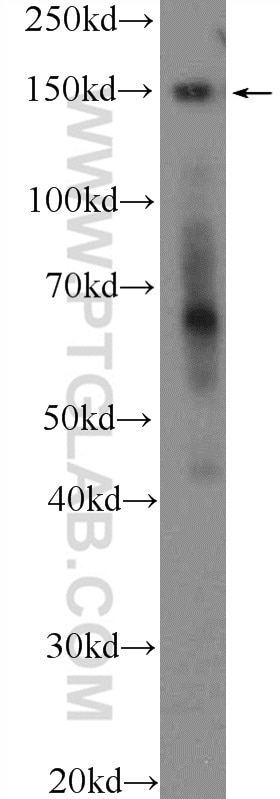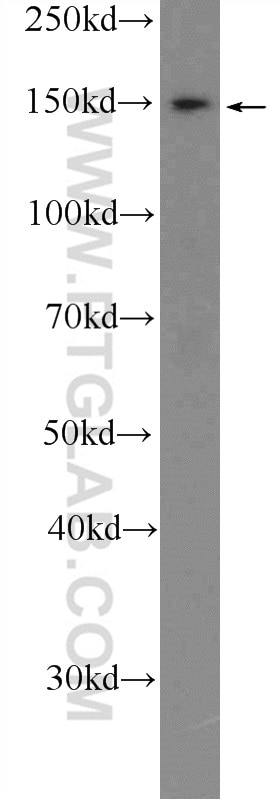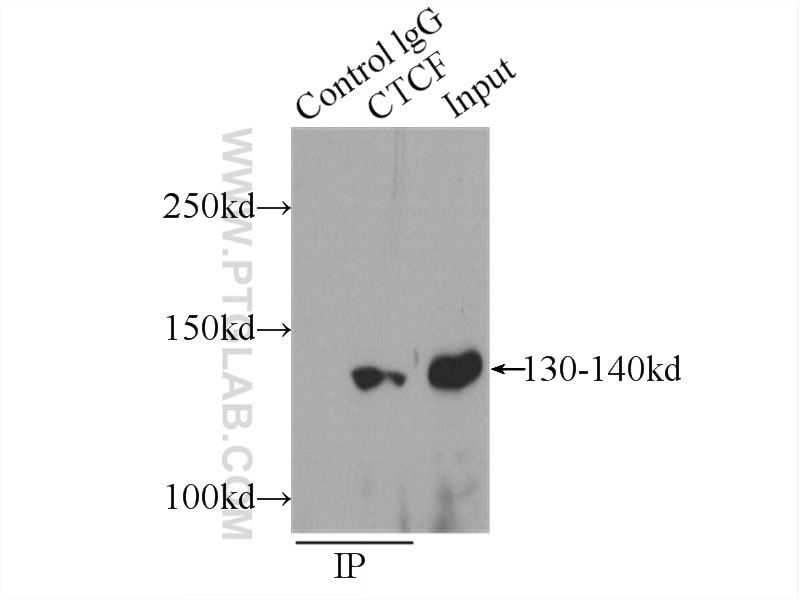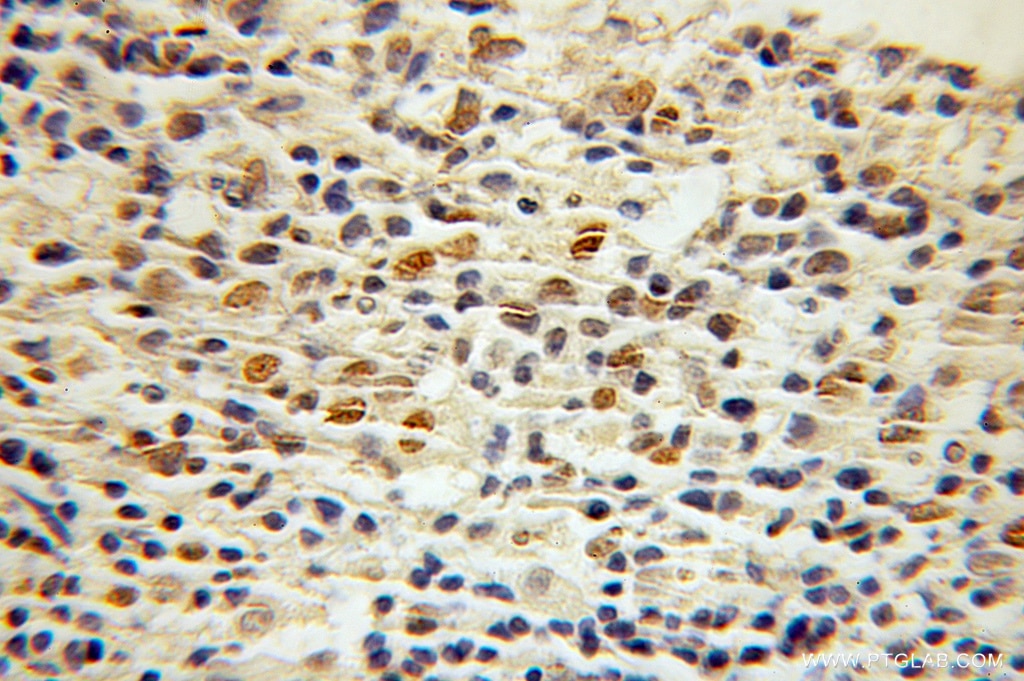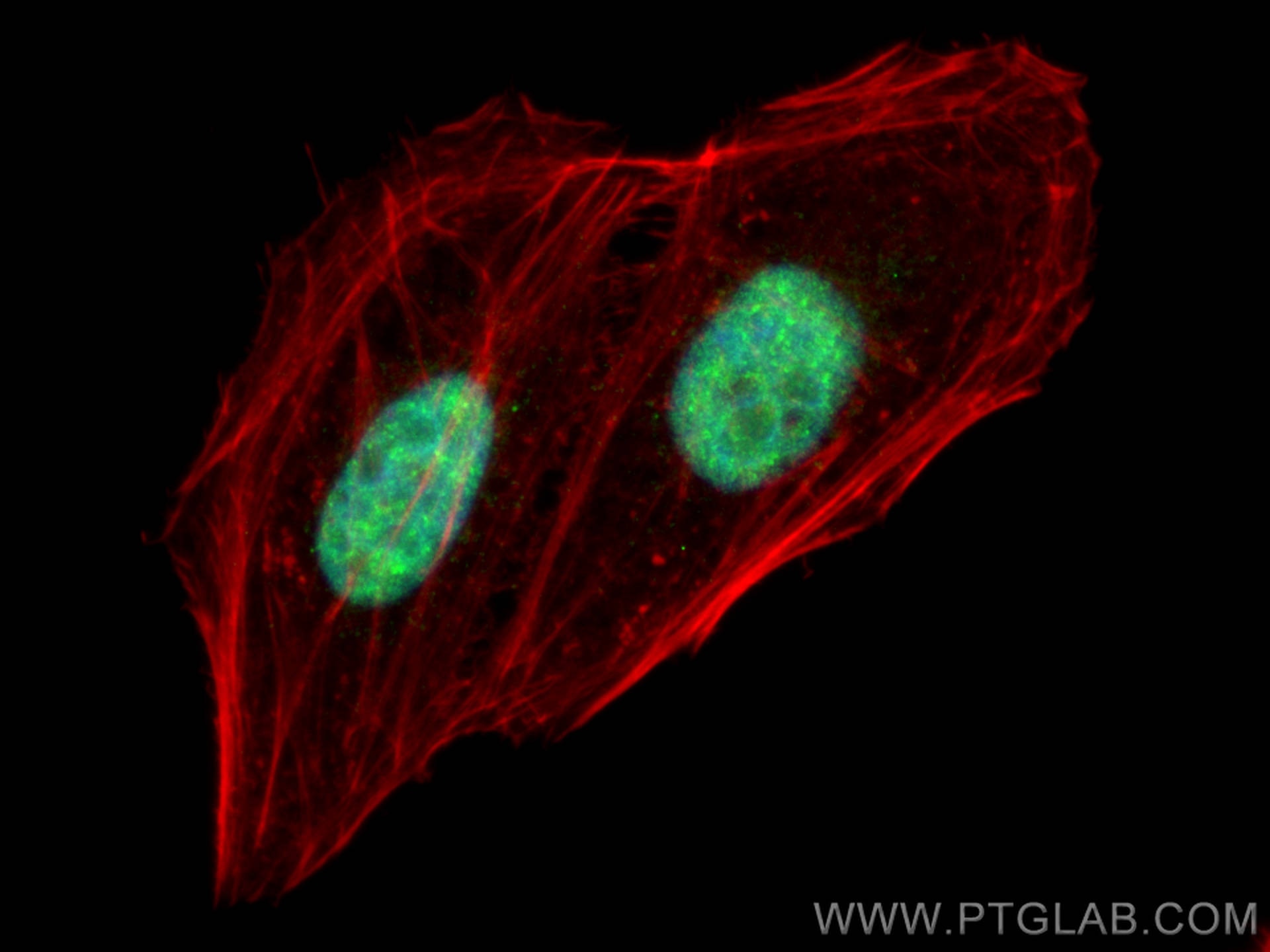Tested Applications
| Positive WB detected in | human brain tissue, 4T1 cells, HEK-293T cells |
| Positive IP detected in | MCF-7 cells |
| Positive IHC detected in | human lymphoma tissue Note: suggested antigen retrieval with TE buffer pH 9.0; (*) Alternatively, antigen retrieval may be performed with citrate buffer pH 6.0 |
| Positive IF/ICC detected in | HepG2 cells |
Recommended dilution
| Application | Dilution |
|---|---|
| Western Blot (WB) | WB : 1:500-1:1000 |
| Immunoprecipitation (IP) | IP : 0.5-4.0 ug for 1.0-3.0 mg of total protein lysate |
| Immunohistochemistry (IHC) | IHC : 1:20-1:200 |
| Immunofluorescence (IF)/ICC | IF/ICC : 1:200-1:800 |
| It is recommended that this reagent should be titrated in each testing system to obtain optimal results. | |
| Sample-dependent, Check data in validation data gallery. | |
Published Applications
| WB | See 4 publications below |
| ChIP | See 1 publications below |
| RIP | See 1 publications below |
Product Information
10915-1-AP targets CTCF in WB, IHC, IF/ICC, IP, ChIP, RIP, ELISA applications and shows reactivity with human, mouse samples.
| Tested Reactivity | human, mouse |
| Cited Reactivity | human |
| Host / Isotype | Rabbit / IgG |
| Class | Polyclonal |
| Type | Antibody |
| Immunogen |
CatNo: Ag1340 Product name: Recombinant human CTCF protein Source: e coli.-derived, PGEX-4T Tag: GST Domain: 369-727 aa of BC014267 Sequence: HIRSHTGERPFQCSLCSYASRDTYKLKRHMRTHSGEKPYECYICHARFTQSGTMKMHILQKHTENVAKFHCPHCDTVIARKSDLGVHLRKQHSYIEQGKKCRYCDAVFHERYALIQHQKSHKNEKRFKCDQCDYACRQERHMIMHKRTHTGEKPYACSHCDKTFRQKQLLDMHFKRYHDPNFVPAAFVCSKCGKTFTRRNTMARHADNCAGPDGVEGENGGETKKSKRGRKRKMRSKKEDSSDSENAEPDLDDNEDEEEPAVEIEPEPEPQPVTPAPPPAKKRRGRPPGRTNQPKQNQPTAIIQVEDQNTGAIENIIVEVKKEPDAEPAEGEEEEAQPAATDAPNGDLTPEMILSMMDR Predict reactive species |
| Full Name | CCCTC-binding factor (zinc finger protein) |
| Calculated Molecular Weight | 83 kDa |
| Observed Molecular Weight | 55-100 kDa, 130-150 kDa |
| GenBank Accession Number | BC014267 |
| Gene Symbol | CTCF |
| Gene ID (NCBI) | 10664 |
| RRID | AB_2086799 |
| Conjugate | Unconjugated |
| Form | Liquid |
| Purification Method | Antigen affinity purification |
| UNIPROT ID | P49711 |
| Storage Buffer | PBS with 0.02% sodium azide and 50% glycerol, pH 7.3. |
| Storage Conditions | Store at -20°C. Stable for one year after shipment. Aliquoting is unnecessary for -20oC storage. 20ul sizes contain 0.1% BSA. |
Background Information
Transcriptional insulators are DNA elements that set boundaries on the actions of enhancer and silencer elements and thereby organize the eukaryotic genome into regulatory domains. All vertebrate insulators appear to use the versatile CTCF protein. CTCF uses various combinations of its 11 zinc fingers to recognize a variety of unrelated DNA sequences. Once bound to DNA, CTCF can function as a transcriptional insulator, repressor, or activator, depending on the context of the binding site [PMID:12787766,15454938]. In vertebrates, this 11 zinc-finger protein is shown to be crucial in processes of epigenetic imprinting, X chromosome inactivation , and associated with various complex human diseases including cancer and diabetes [PMID:23139640]. The calcualted molecular weight of CTCF is 83 kDa, but stimulation of human corneal epithelial cells with hypoxic stress suppressed a high molecular mass form of CTCF (150 kDa), but not a lower molecular weight form of CTCF (130 kDa)(PMID: 22354964), and there are multiple isoforms of CTCF with molecular masses of 55, 70, 73, 80, 97, and 130 kDa have been observed (PMID: 12878173).
Protocols
| Product Specific Protocols | |
|---|---|
| IF protocol for CTCF antibody 10915-1-AP | Download protocol |
| IHC protocol for CTCF antibody 10915-1-AP | Download protocol |
| IP protocol for CTCF antibody 10915-1-AP | Download protocol |
| WB protocol for CTCF antibody 10915-1-AP | Download protocol |
| Standard Protocols | |
|---|---|
| Click here to view our Standard Protocols |
Publications
| Species | Application | Title |
|---|---|---|
Sci Total Environ Transcriptome sequencing analysis reveals a potential role of lncRNA NONMMUT058932.2 and NONMMUT029203.2 in abnormal myelin development of male offspring following prenatal PM2.5 exposure | ||
Carcinogenesis Hepatocellular carcinoma risk variant modulates lncRNA HLA-DQB1-AS1 expression via a long-range enhancer-promoter interaction. | ||
mBio A Low-Producing Haplotype of Interleukin-6 Disrupting CTCF Binding Is Protective against Severe COVID-19. | ||
Cell Signal USP27 promotes glycolysis and hepatocellular carcinoma progression by stabilizing PFKFB3 through deubiquitination | ||
Cancer Cell Int CTCF-activated FUCA1 functions as a tumor suppressor by promoting autophagy flux and serum α-L-fucosidase serves as a potential biomarker for prognosis in ccRCC | ||
Adv Sci (Weinh) TWF2 Drives Tumor Progression and Sunitinib Resistance in Renal Cell Carcinoma through Hippo Signaling Suppression |

